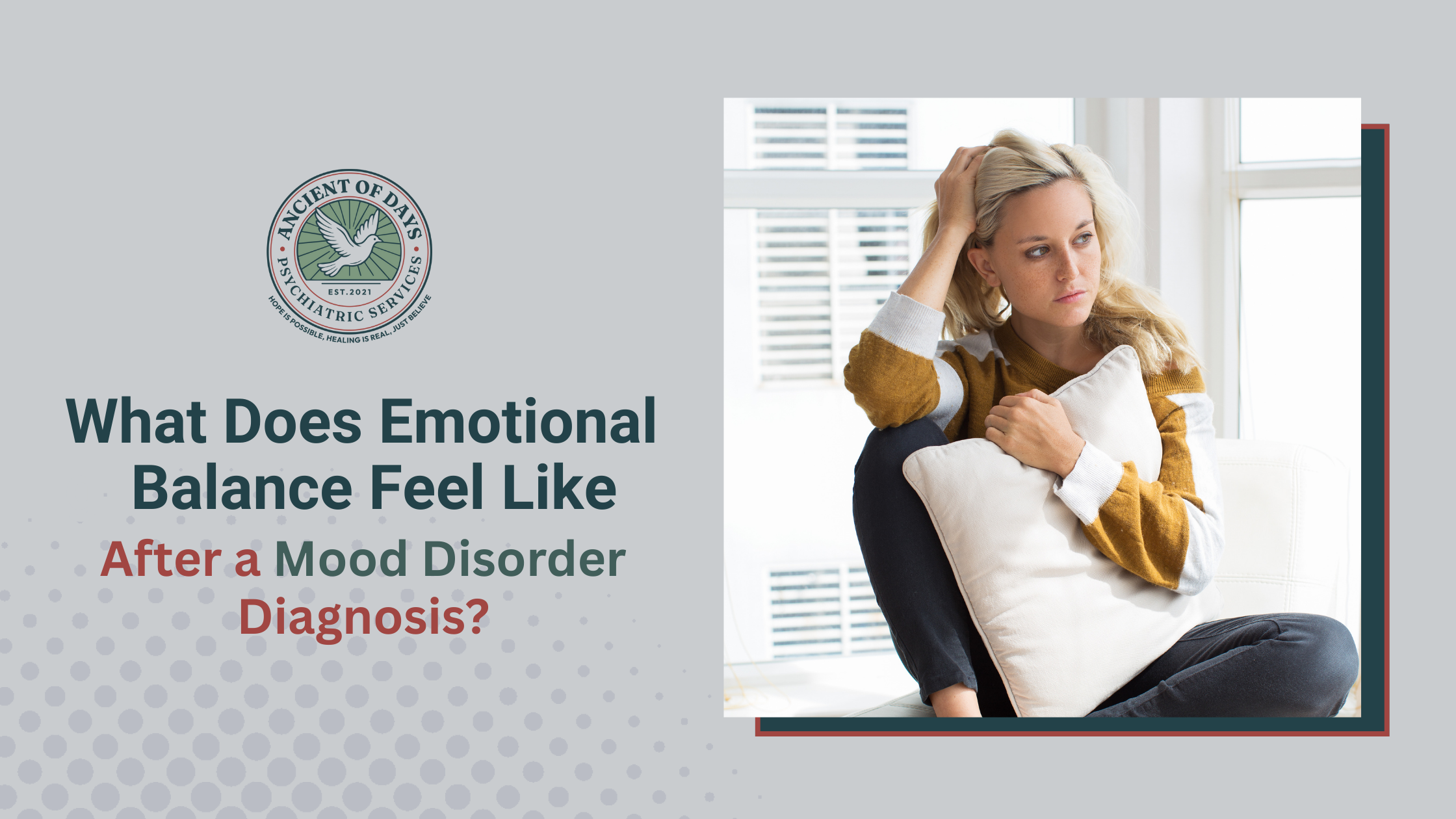Getting a mood disorder diagnosis can feel heavy. You might feel scared, sad, confused, or relieved. Emotional balance does not happen fast. It grows with small steps. We explain what balance can feel like. We also show simple things that help. The goal is to make this clear and kind.
What Emotional Balance Means
Emotional balance means your feelings are easier to handle. Ups and downs still happen. But you can notice your feelings and respond. You do not feel stuck in one mood all the time. You can sleep, eat, and do daily tasks more often. You can enjoy small things again.
How It Feels Day To Day
Balance may look different for each person. Here are common signs people notice:
- Mornings are not as hard. You can get up more often.
- You can do one or two tasks each day.
- You feel less of the very strong sadness or worry.
- Your thoughts are clearer. You can make simple plans.
- You can talk with people more without shutting down.
- Bad days still come, but they pass faster.
These are small changes. They matter. They add up.
Feelings That Might Surprise You
After treatment starts, you may feel mixed emotions. This is normal.
- Relief that you have help.
- Grief for the time you spent hurting.
- Hope for the future.
- Fear that the mood will come back.
All of these are okay. Talk about these with your provider or a trusted friend.
What Helps: Treatment and Support
Emotional balance grows from real care. Ancient Of Days Psychiatry, LLC, focuses on mood disorders. We use proven treatments. These help many people feel better.
- Therapy: Speaking with a therapist teaches you techniques. You discover ways to cope with difficult emotions.
- Medicine: Some people need medicine to steady their mood. A trained provider, like Susan Gilbert, ARNP, PMHNP-BC, can guide this.
- Routine: A simple daily plan helps. Sleep, food, and small exercise matter.
- Support: Family, friends, and support groups help you feel less alone.
You don’t need to do everything in a single attempt. Start with one steady step.
Small Skills That Make a Big Difference
Big change comes from small habits. Try one or two of these:
- Name the feeling. Express, “I feel down” or “I feel anxious.”
- Breathe slowly for one minute. Focus on your breath.
- Move your body for 5 to 10 minutes. A short walk helps.
- Write one sentence about your day.
- Set a tiny goal, like brushing your teeth. Celebrate when you do it.
These actions help your brain learn safety and calm. Do them often.
How to Talk About Your Feelings
Talking helps balance grow. Use simple words. Tell someone what you need. Try this script:
- “I had a hard day. Can we talk for five minutes?”
- “I need help with my plan for the day.”
- “I’m feeling a bit off. Can you spend some time with me?”
Clear talk helps others help you.
When to Reach Out For More Help
Ask for help when things get worse. Seek help if:
- You think about hurting yourself.
- You cannot sleep or eat for many days.
- You stop doing the things that matter to you.
- Your work, school, or family life is at risk.
If you feel unsafe, contact a trusted person or local emergency services right away.
How Ancient Of Days Psychiatry Can Help
Ancient Of Days Psychiatry, LLC helps people with mood disorders like depression, anxiety, and bipolar disorder. Our team offers therapy and medicine when needed. Susan Gilbert, ARNP, PMHNP-BC, leads care with skill and kindness. We work with children, teens, adults, and older adults.
We focus on learning your story. Then we make a plan just for you. That plan can include therapy, medicine, or both. We also help with things like sleep, stress, and life changes. Our goal is simple. We want you to feel steadier and to live a fuller life.
What This Really Means For You
Balance is not perfect. It is a mix of better days and hard days. Over time, the better days come more often. You will notice you can do more of what matters to you. You will feel more like yourself.
Take small steps. Use the supports around you. Talk with your care team. With time and help, emotional balance can grow.
Conclusion
If you experience a mood disorder, know that you are not alone. Healing is a path. It takes care, patience, and the right support. Ancient Of Days Psychiatry is ready to walk with you. We listen. We plan with you. We help you build a life with more steady moments and more hope.
FAQs
Q. Will medicine help me?
Sometimes. Medicine can steady your mood. A trained provider will help decide.
Q. How can Ancient Of Days Psychiatry help me?
They offer therapy and medicine when needed. Susan Gilbert and the team make a plan just for you and help you step by step.


No comment